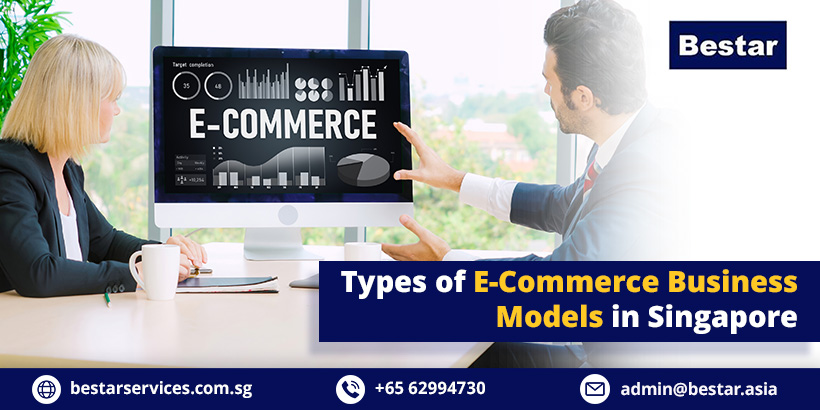Post-Pandemic consumers primarily prefer online shopping platforms, which has moved sellers and businesses to take their business online on E-Commerce platforms, which has cashed them significant revenues. This has inspired and motivated new E-Commerce business ventures and entrepreneurs to earn substantial profits.
If you are thinking of starting your E-Commerce business or taking your seasoned business to diversify your business into E-Commerce, 2023 is the best time.
However, various questions arise regarding how to start your E-Commerce business, types of E-Commerce business models, and related questions. In this blog, we will walk you through the types of E-Commerce business models in Singapore.
Primary Categories of E-Commerce Models
There are various categories of E-Commerce Models in the modern day. However, there are four primary traditional categories of E-Commerce Models:
Business to Business (B2B)
Any transaction made between two businesses. It can be a wholesale business, manufacturer, or distributor.
Business to Consumer (B2C)
Most popular E-Commerce model. It involves businesses selling their products to consumers (the general public). It is direct selling and buying without any third-party involved.
Consumer to Business (C2B)
It involves websites & platforms for individuals to sell their products/services to other businesses. The most common example is freelancers, such as graphic designers, content writers, and software designers. C2B common platforms are Amazon & Upwork Inc.
Consumer to Consumer (C2C)
It involves consumers selling & buying from other consumers through a website. Common examples are eBay, Amazon Marketplace, and Etsy.
Types of E-Commerce Models
Wholesale
Wholesale involves B2B, where one business will manufacture its products & sell them to other businesses at wholesale prices. Products & Services are sold in bulk quantities at a discounted pricing.
It doesn’t involve any middleman or a third party. The businesses selling the products & services help the manufacturer market their products & services.
Subscription-based Model
Subscription-based E-Commerce business model involves offering products or services to consumers that are automatically renewed monthly/quarterly/annually, or ordered often. Consumers have the option to renew/cancel their subscription anytime.
A common example is Amazon, which offers free delivery, cashback, and additional discount with its Amazon Prime subscription to its users.
Advertising Revenue Model
This model allows companies to advertise products/services on websites, social media platforms, blogs, in-app advertising, and various ways. Users clicking on the ads get directed to the product/service page.
It is primarily seen on Google websites, Facebook, and Instagram. Companies using this model charge a flat fee for advertising on a pay-per-click (PPC) basis.
Affiliate Revenue Model
This is one of the most come-across business models involving articles or blog posts containing affiliate links. It means businesses earn revenues through promoting and selling another company’s or individual’s product/service on their website. This concept is called affiliate marketing, which is based on the revenue-sharing principle.
Subscription Revenue
In this model, the revenue stream generates from subscription fees, which are monthly, quarterly, half-yearly, or yearly depending on the subscription package offered by the seller and purchased by the consumer.
Common examples are Spotify, Netflix, & Apple TV. It also involves E-Commerce Businesses selling subscription boxes such as books, gifts, and snacks.
Transaction Fee Model
This revenue model involves a fee charged whenever a transaction is made through their payment platforms. This fee serves as the revenue for the businesses. Even though the fee is minimal, the overall revenues are significant for making payments. A common example is PayPal.
Dropshipping
This model format is similar to B2C, where a business sells the product/service to the consumer, but the business fulfills the order. It is the supplier who fulfills the order.
Common examples are Amazon & eBay, where sellers store their products at E-Commerce platform warehouses and don’t have to worry about renting/owning a warehouse for storing their products.
Though this business model is popular, its biggest disadvantage is that you are not in control of the order fulfillment. Businesses are unsure whether goods have been delivered to the customers or not.
White-Label
Another most popular E-Commerce Business Model is White-Label. It involves mass manufacturing a generic product, which is rebranded and sold under another brand name.
A third-party company does the manufacturing, and the seller rebrands it to their brand/company logo and name. These products are manufactured in bulk quantities and can be bulk ordered or drop shipped.
It is one of the most cost-effective business models, as the seller doesn’t have to make a massive investment to manufacture the products. They can simply purchase from the manufacturer and rebrand it under their name & logo for selling to consumers.
Sales Revenue Model
Last but the most ordinary & used E-Commerce Business Model is Sales Revenue Model, which involves a straightforward revenue stream. When a consumer purchases a product/service online, the seller earns revenue from the consumer’s online transaction.
Note: If you want to start your new E-Commerce Business Venture or take existing offline Business online, we recommend outsourcing your Accounting & Bookkeeping Services. It will help you utilize the saved time, resources, and cost in your core business activities to grow your online Business.
At Bestar Services, we provide comprehensive Account and Bookkeeping Services. Being one of the leading Accounting Outsourcing Service Providers in Singapore, we provide timely reports to ensure you have all the required reports at your access.
Conclusion
After reading the blog, you will have a comprehensive understanding of the categories of E-Commerce Models and types of E-Commerce Business Models in Singapore.
However, if you have any questions regarding which E-Commerce Business Model or need Business Advisory Consultation, feel free to contact us.
At Bestar Services, we provide comprehensive business services related to HR & Payroll, Accounting & Bookkeeping, Financial Audit & Assurance, GST Registration, Business Advisory, Tax Advisory & Compliance, and more.
We also provide comprehensive Company Registration Services to help you set up your company & Business in Singapore. For any questions regarding our outsourcing Accounting services to us and quotation, contact us at +65 62994730 or email at admin@bestar.asia.







